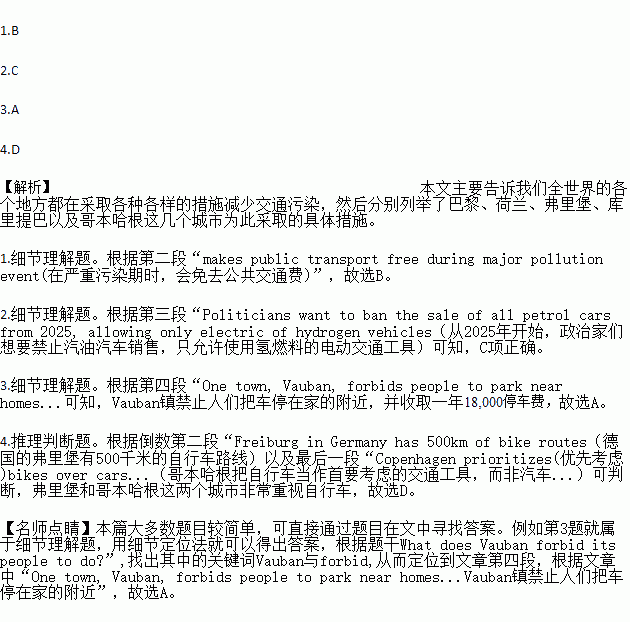题目内容
More cycling, better public transport and car bans… Places all over the world are taking a range of measures to lower traffic pollution.
Paris
Paris bans cars in many historic central districts on weekends, places odd-even(单双日制的) bans on vehicles, makes public transport free during major pollution events and encourages car-sharing programs. A long section of the right bank of the river. Seine is now car-free and a monthly ban on cars has come into force along the Champs-Elysees.
The Netherlands
Politicians want to ban the sale of all petrol cars from 2025, allowing only electric of hydrogen vehicles. The new law will allow anyone who already owns a petrol car to continue using it. Most cities encourage bicycle use.
Freiburg
Freiburg in Germany has 500km of bike routes and a cheap and efficient public transport system. One town, Vauban, forbids people to park near homes and makes car-owners pay 18,000 for a space on the edge of town. In return for living without a car, people are offered cheaper housing, free public transport, and plentiful bicycle spaces.
Curitiba
The southern Brazilian city of two million people has one of the biggest and lowest-cost bus systems in the world. Nearly 70% of its people go to work by public transport and the result is pollution-free air and traffic-free streets.
Copenhagen
Copenhagen prioritizes(优先考虑) bikes over cars and now has more cycles than people. The city calculates that one mile on a bike is worth $0.42 to society, while one mile in a car is a $0.2 loss. Large parts of the Danish capital have been closed to vehicles for decades.
1.What will happen in Paris during major pollution events?
A. Historic central districts won’t allow cars in.
B. People can take public transport free of charge.
C. Car-sharing programs will raise money publicly.
D. People must obey the old-even traffic restrictions.
2.From 2025, the Netherlands will ________.
A. put 500km of bike routes into full use
B. completely forbid the use of petrol cars
C. only allow the sale of electric or hydrogen vehicles
D. own the biggest and lowest-cost bus system in the world
3.What does Vauban forbid its people to do?
A. Park their cars around their homes. B. Sell or buy parking spaces.
C. Occupy bicycle spaces. D. Go to work by car.
4.Which of the following cities attach great importance to cycling?
A. Park and Curitiba. B. Paris and Freiburg.
C. Curitiba and Copenhagen. D. Freiburg and Copenhagen.
 天天向上一本好卷系列答案
天天向上一本好卷系列答案 小学生10分钟应用题系列答案
小学生10分钟应用题系列答案

 d landslides (山崩). In the hard-hit mountain province of Benguet, landslides 3. (cause) by the typhoon killed at least 12 people by the time resc
d landslides (山崩). In the hard-hit mountain province of Benguet, landslides 3. (cause) by the typhoon killed at least 12 people by the time resc uers arrived, including four gold miners
uers arrived, including four gold miners